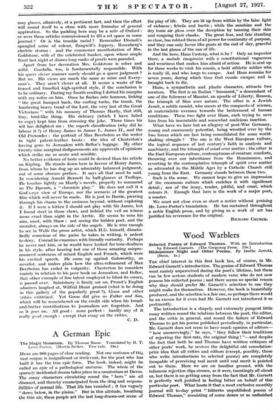A German Epic
The Magic Mountain. By Thomas Mann. Translated by H. T. Lowe-Porter. (Martin Seeker. Two vols. 18s.) HERE are 900 pages of close reading. Not one sentence of this vast corpus is insignificant or irrelevant, for the poet who has built it has the true epic form. The book, indeed, might be called an epic of a pathological universe. The whole of the sparsely ineidented drama takes place in a sanatorium at Davos. The many characters circulating round the " hero" are all diseased, and thereby emancipated from the drag and respons- ibilities of normal life. That life has vanished ; it lies vaguely " down below, in the plains." But in this altitude, breathing the thin air,--these people act the last long-drawn-out scene of the play of life. They are lit up from within by the false light of sickness ; febrile and hectic ; while the sunshine and the dry tonic air gloss over the deception by tanning their skin and rougeing their cheeks. The great fear, and fate standing so close, has robbed them of all power for continuity of purpose, and they can only hover like gnats at the end of day, graceful in the last gleam of the sun of life.
And the hero, Hans Castorp, what is he ? Only an impostor there, a malade imaginaire with a constitutional vagueness and weariness that makes him afraid of action. He is sent up for three weeks to visit his cousin, a bold athletic soldier who is really ill, and who longs to escape. And Hans remains for seven years, during which time that cousin escapes and is brought back to die.
Hans, a sympathetic and plastic character, attracts two mentors. The first is an Italian " humanist," a descendant of one of the followers of Mazzini, an apostle of Liberty, Reason, the triumph of Man over nature. The other is a Jewish Jesuit, a subtle casuist, who sneers at the conquests of science, at materialistic avenues towards the betterment of human conditions. These two fight over Hans, each trying to save him from his inscrutable and somewhat malicious inaction. What have we here but an allegory of post-War Germany, young and enormously potential, being wrestled over by the two forces which are fast being consolidated for some world- shaking struggle ? The one is the West European culture, the logical sequence of last century's faith in analysis and machinery, and the triumph of mind over matter the other is the East European culture, contemptuous of creature comforts, throwing over our inheritance from the Renaissance, and reverting to the contemplative triumph of spirit over matter as advocated in the Middle Ages by a Catholic Church still young from the East. Germany stands between these two.
Such is the scene. We cannot hope to give an impression of the enormous culture which enriches it with significant detail ; nor of the irony, tender, pitiful, and cruel, which colours it. Enough that here is the work of a major poet, a master.
We must not close even so short a notice without praising Mr. Lowe-Porter's translation. He has sustained throughout a noble English prose, and by giving us a work of art has justified his reverence for the original.
RICHARD CHURCH.


































 Previous page
Previous page